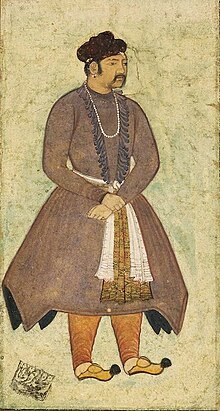Katzeb

Katzeb (kamarband, Kayabandh, Cummerbund) was an article of dress encircling the body, at the waist with ends hanging in the front. It was a kind of sash also called Patka.[1][2][3][4]
Name
Katzeb is a compound word. The Sanskrit word Kati means waist, and Zeb in Persian means adorn. Mughals wore it over the Jama (coat). The Katzeb is a girdle named by the third Mughal emperor Akbar who was very fashion enthusiastic and gave a new name to many contemporary costumes. These are described in Ain-i-Akbari by Abu'l-Fazl ibn Mubarak.[1][5][6][7][8][9]
Court costume
Katzeb was a small rectangular piece of cloth but it was an essential garment of the dress that includes a jama (a coat), shawl, turban tanzeb (trouser). There are many Mughal paintings of the emperors with a sword or dagger tucked in Katzeb.[10][11]
Styles
The katzeb is simple cloth belt like garment possible with many variants such as plain, laced, embroidered, brocaded or printed.[7]
See also
References
- ^ a b Condra, Jill (2008). The Greenwood Encyclopedia of Clothing Through World History: 1501-1800. Greenwood Publishing Group. pp. 212, 211. ISBN 978-0-313-33664-5.
- ^ ''The patka or katzeb (sash), a band of cloth fastened round the waist over the jama ...'' Page 10 Flora and Fauna in Mughal Art Som Prakash Verma · 1999 [1]
- ^ Bhushan, Jamila Brij; Brijbhushan, Jamila (1958). The Costumes and Textiles of India. Taraporevala's Treasure House of Books. p. 32.
- ^ Mohamed Nasr. A Study Of Mughal Emperial Costumes And Designs During 16th And 17th Century. p. 14.
- ^ "Definition of GIRDLE". www.merriam-webster.com. Retrieved 2021-01-08.
- ^ A. Fazal, Ain-i-Akbari, vol. 1, p. 96
- ^ a b Verma, Som Prakash (1978). Art and Material Culture in the Paintings of Akbar's Court. Vikas. pp. 51, 46, 47. ISBN 978-0-7069-0595-3.
- ^ Ibn-Mubārak, Abu-'l-Faḍl (1873). "The" Ain i Akbari : 1. p. 90.
- ^ Sharma, Monika (2014-12-03). Socio-Cultural Life of Merchants in Mughal Gujarat. Partridge Publishing. ISBN 978-1-4828-4036-0.
- ^ Verma, Som Prakash (2005). Painting the Mughal Experience. Oxford University Press. p. 59. ISBN 978-0-19-566756-1.
- ^ Houghteling, Sylvia (2017). "The Emperor's Humbler Clothes: Textures of Courtly Dress in Seventeenth-century South Asia". Ars Orientalis. 47 (20191029). doi:10.3998/ars.13441566.0047.005. hdl:2027/spo.13441566.0047.005. ISSN 2328-1286.
